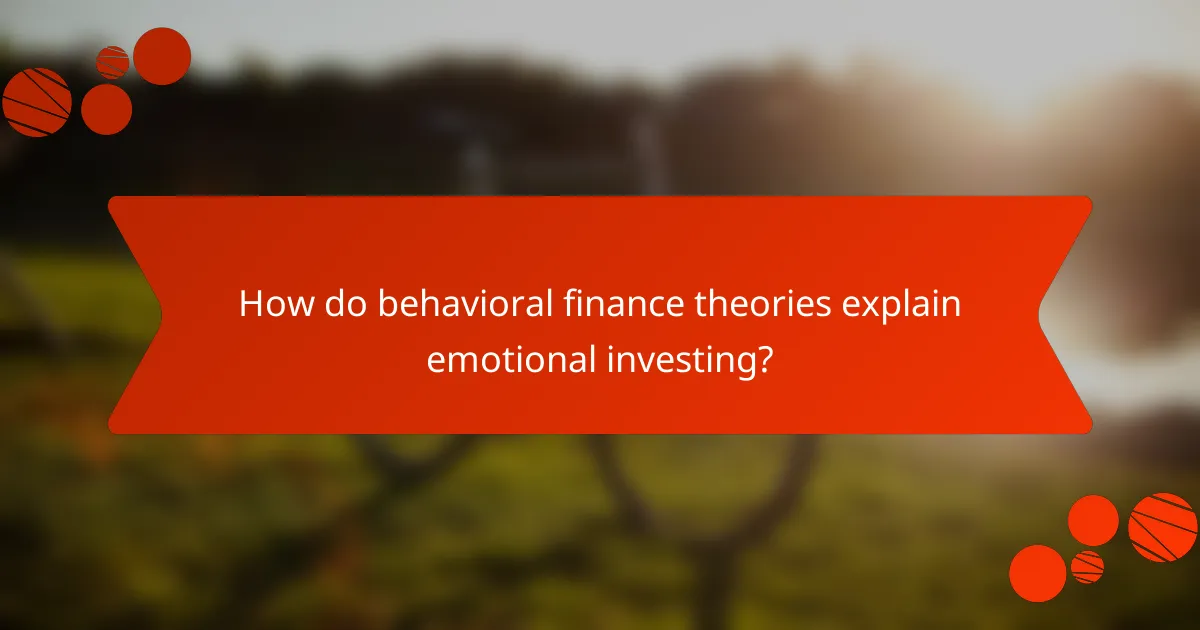Emotions significantly impact investment decisions, often leading to irrational choices that can adversely affect financial outcomes. Investors frequently respond to market fluctuations based on feelings rather than logic, resulting in poorly timed buying or selling. Understanding the role of emotions in investing is crucial, as structured strategies can help mitigate their influence and promote more objective decision-making.

How do emotions influence investment decisions?
Emotions play a significant role in investment decisions, often leading to irrational choices that can impact financial outcomes. Investors may react to market fluctuations based on feelings rather than logic, which can result in buying or selling at inopportune times.
Impact of fear on selling stocks
Fear can drive investors to sell stocks during market downturns, often leading to losses. When the market experiences volatility, the fear of further declines can trigger panic selling, causing investors to exit positions prematurely.
To mitigate fear-driven decisions, investors should establish a clear investment strategy and stick to it, regardless of market conditions. Setting stop-loss orders can also help manage risk without succumbing to emotional impulses.
Role of greed in buying behavior
Greed often influences investors to buy stocks in hopes of quick profits, sometimes leading to overvaluation. This behavior can result in purchasing assets at inflated prices, increasing the risk of significant losses when the market corrects.
To counteract greed, investors should focus on fundamental analysis and long-term value rather than short-term gains. Setting realistic profit targets and adhering to a disciplined investment plan can help maintain a balanced approach.
Emotional biases affecting market trends
Emotional biases, such as herd mentality and overconfidence, can significantly affect market trends. Investors may follow the crowd, leading to asset bubbles, or they may overestimate their ability to predict market movements, resulting in poor investment choices.
Awareness of these biases is crucial for making informed decisions. Investors should seek diverse perspectives and rely on data-driven analysis to counteract emotional influences and enhance decision-making processes.

What strategies can mitigate emotional decision-making?
To mitigate emotional decision-making in investing, adopting structured strategies is essential. These approaches help maintain objectivity and reduce the influence of emotions on investment choices.
Implementing a disciplined investment plan
A disciplined investment plan involves setting clear goals, defining asset allocation, and adhering to a predetermined strategy. This helps investors avoid impulsive decisions driven by market fluctuations or emotional responses.
Regularly reviewing and rebalancing the portfolio according to the plan can further reinforce discipline. For instance, if a particular asset class exceeds its target allocation, selling a portion can help maintain balance and reduce risk.
Using automated trading systems
Automated trading systems can significantly reduce emotional decision-making by executing trades based on predefined criteria. These systems operate on algorithms that follow specific rules, eliminating the emotional component from trading decisions.
Investors can set parameters such as entry and exit points, stop-loss limits, and profit targets. This allows for consistent execution of strategies without the influence of fear or greed. However, it’s crucial to monitor these systems regularly to ensure they align with market conditions.
Practicing mindfulness in investing
Practicing mindfulness in investing involves being aware of one’s thoughts and emotions while making investment decisions. This awareness can help investors recognize emotional triggers and prevent rash actions based on fear or excitement.
Techniques such as meditation or reflective journaling can enhance mindfulness. For example, taking a moment to pause and assess feelings before making a trade can lead to more rational decisions. Additionally, setting aside time for regular self-reflection on investment performance can foster a more objective perspective.

How do behavioral finance theories explain emotional investing?
Behavioral finance theories illustrate how emotions influence investment decisions, often leading to irrational choices. These theories highlight the psychological factors that can cause investors to deviate from rational financial behavior, affecting market dynamics.
Overview of prospect theory
Prospect theory, developed by Daniel Kahneman and Amos Tversky, describes how people make decisions involving risk and uncertainty. It posits that individuals value gains and losses differently, leading to risk-averse behavior when facing potential gains and risk-seeking behavior when facing potential losses.
This theory emphasizes that investors are more sensitive to losses than to equivalent gains, which can lead to suboptimal investment choices. For example, an investor might hold onto a losing stock longer than advisable, hoping to avoid realizing a loss.
Understanding loss aversion
Loss aversion refers to the tendency to prefer avoiding losses over acquiring equivalent gains. Research indicates that the pain of losing is psychologically about twice as powerful as the pleasure of gaining, which significantly impacts investment strategies.
Investors may irrationally hold onto underperforming assets due to the fear of loss, often missing better opportunities. To counteract this, investors should set clear exit strategies and adhere to them, minimizing emotional decision-making.
Application of herding behavior
Herding behavior occurs when individuals mimic the actions of a larger group, often leading to market bubbles or crashes. This phenomenon is driven by the emotional desire to conform and the belief that the crowd possesses more information.
Investors should be cautious of following trends without conducting their own analysis. A practical approach is to evaluate market fundamentals rather than relying solely on popular sentiment, helping to avoid pitfalls associated with herd mentality.

What tools can help investors manage emotions?
Investors can utilize various tools to effectively manage their emotions during investment decisions. These tools help in tracking performance, receiving professional guidance, and understanding behavioral patterns that influence financial choices.
Investment tracking apps
Investment tracking apps allow investors to monitor their portfolios in real-time, providing insights into performance and market trends. Popular options include apps like Robinhood, Acorns, and Personal Capital, which offer features such as performance analytics and alerts for significant market changes.
When choosing an app, consider user interface, available features, and whether it supports the assets you invest in. Regularly reviewing your portfolio through these apps can help mitigate emotional reactions to market fluctuations.
Financial advisory services
Financial advisory services provide personalized guidance to help investors navigate emotional challenges. Advisors can offer strategies tailored to individual risk tolerance and investment goals, helping to maintain a rational perspective during market volatility.
Investors should look for advisors with a fiduciary duty, ensuring they act in the client’s best interest. Regular consultations can help reinforce discipline and provide a buffer against impulsive decisions driven by fear or greed.
Behavioral finance workshops
Behavioral finance workshops educate investors about the psychological factors that affect their decision-making. These workshops often cover common biases, such as overconfidence and loss aversion, and teach strategies to counteract them.
Participating in such workshops can enhance self-awareness and improve emotional regulation in investing. Look for local or online options that offer practical exercises and real-life scenarios to better understand emotional influences on investment behavior.

What are the emotional impacts of market volatility?
Market volatility can significantly affect investors’ emotions, leading to heightened anxiety or irrational exuberance. Understanding these emotional impacts is crucial for making informed investment decisions and maintaining a balanced portfolio.
Investor anxiety during downturns
During market downturns, many investors experience anxiety, which can lead to impulsive decisions such as panic selling. This emotional response often stems from fear of losses and uncertainty about future market conditions.
To manage anxiety, investors should focus on their long-term investment strategies rather than reacting to short-term fluctuations. Maintaining a diversified portfolio can help mitigate risks and provide a sense of security during turbulent times.
Effects of market euphoria on decision-making
Market euphoria can lead to overly optimistic decision-making, causing investors to take on excessive risks. This emotional high often results in buying assets at inflated prices, driven by the fear of missing out (FOMO).
To counteract the effects of euphoria, investors should establish clear investment goals and stick to their strategies. Regularly reviewing and rebalancing portfolios can help ensure that decisions remain grounded in rational analysis rather than emotional impulses.

How can investors cultivate emotional intelligence?
Investors can cultivate emotional intelligence by developing self-awareness, managing their emotions, and enhancing their decision-making skills. This involves recognizing emotional triggers and understanding how feelings impact investment choices.
Self-reflection techniques
Self-reflection techniques are essential for investors to assess their emotional responses to market changes. Regularly evaluating past decisions can help identify patterns in emotional reactions, allowing for more informed choices in the future.
One effective method is to maintain a trading journal. Documenting thoughts and feelings during trades can reveal insights into emotional biases, such as fear or overconfidence. Reviewing this journal periodically can highlight areas for improvement.
Another technique involves mindfulness practices, such as meditation or deep-breathing exercises. These practices can help investors stay grounded during market volatility, reducing impulsive reactions and promoting clearer thinking when making investment decisions.



